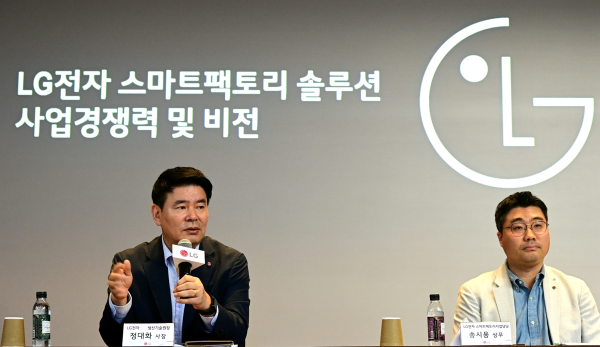ຂປລ
(KPL/Yonhap) LG Electronics Co. said Thursday it aims to achieve over 1 trillion won (US$725.2 million) in sales from its smart factory solution business by 2030, leveraging its artificial intelligence technologies and manufacturing expertise.

(KPL/Yonhap) LG Electronics Co. said Thursday it aims to achieve over 1 trillion won (US$725.2 million) in sales from its smart factory solution business by 2030, leveraging its artificial intelligence technologies and manufacturing expertise.
This year, the South Korean home appliance giant entered the smart factory solution market, offering technologies and services to transform traditional manufacturing facilities into automated and digitized smart factories.
LG Electronics highlighted its extensive experience and data in the smart factory solution sector, accumulated through its production technology research lab, LG Production Engineering Research Institute (PRI). The lab has undertaken projects on production customization and manufacturing operation development for LG affiliates, including LG Energy Solution and LG Display Co.
It is part of the South Korean tech company's recent moves to advance its digital transformation strategy, aiming to evolve into a software-based platform company beyond its traditional hardware focus.
We've secured orders worth 200 billion won from companies outside of LG Group so far this year, and the figure is expected to reach 300 billion won at the end of the year," Jeong Dae-hwa, president of LG PRI, said in a press event.
"We aim to expand the smart factory solution business to achieve more than 1 trillion won in sales by 2030."
According to market research firm Precedence Research, the global smart factory market is projected to grow from $155.6 billion in 2024 to $268.5 billion by 2030.
LG Electronics said its smart factory solutions utilize various AI models, including the company's super-large multimodal AI and Google's Gemini, to seek optimized programs for customers' needs and production lines.
"We use what works best and propose better solutions by combining multiple technologies or improving them," Jeong said. "We don't rely solely on internal sourcing."
The company said its customers include secondary battery producing companies, auto parts makers and logistic companies.
Most of them are Korean companies who build new facilities or renovate their plants in North America and Asia. But it declined to disclose specific client names.
LG Electronics said it plans to accelerate its business expansion by targeting industries with rising factory demand, such as pharmaceuticals, biotechnologies, and food and beverages.
LG Electronics' manufacturing plants in Tennessee, the United States, and Changwon, South Korea, have been recognized by the World Economic Forum (WEF) and included in its Lighthouse Factory network.
This designation signifies that these plants have implemented Fourth Industrial Revolution technologies, including AI and the Internet of Things (IoT), into their daily manufacturing and supply chain operations.
Following the smart factory transition at the Changwon plant, productivity increased by 17 percent and energy efficiency rose by 30 percent, while costs related to quality issues decreased 70 percent, LG Electronics said.
About 60 manufacturing facilities of LG Group affiliates in 40 countries have adopted LG Electronics' smart factory solutions, according to the company.
KPL